鲁教版(五四制)英语八年级上册 Unit 7 Have you ever been to a museum 知识点讲义
文档属性
| 名称 | 鲁教版(五四制)英语八年级上册 Unit 7 Have you ever been to a museum 知识点讲义 | 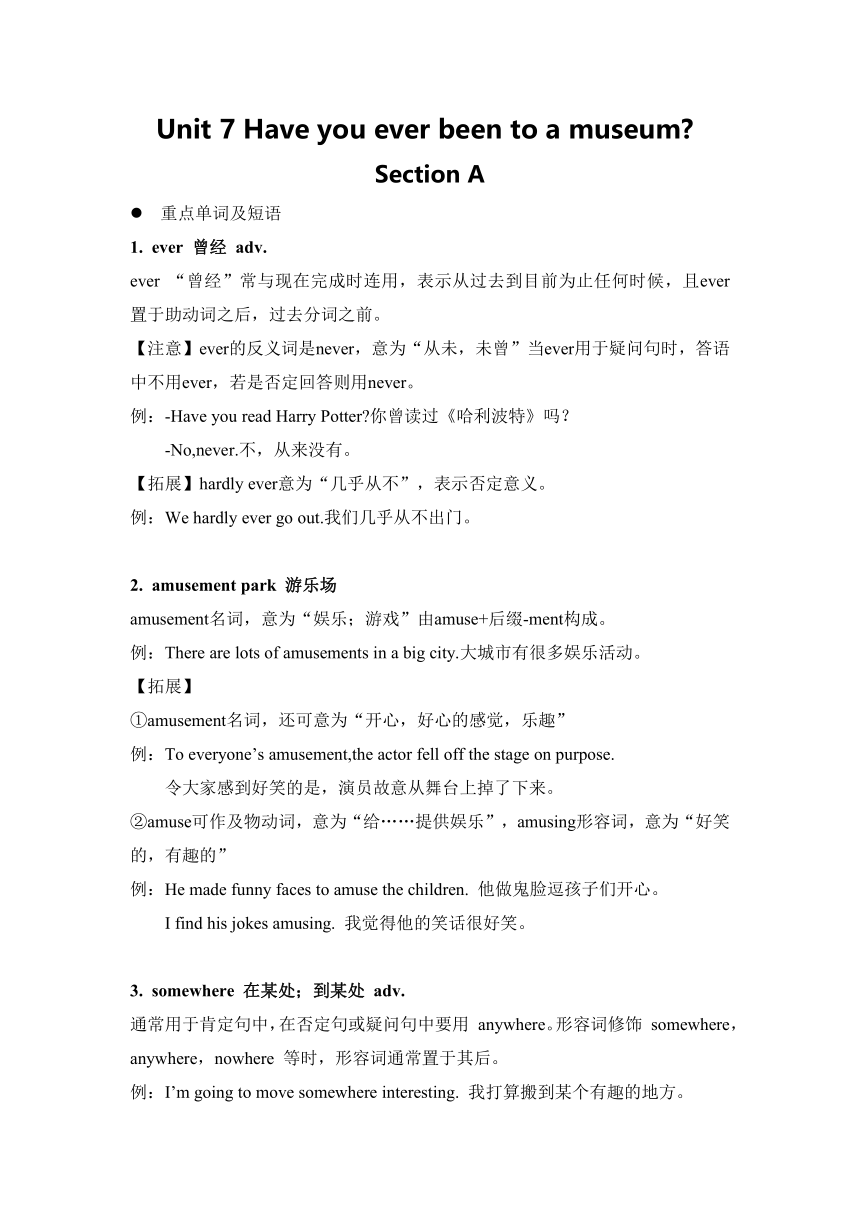 | |
| 格式 | docx | ||
| 文件大小 | 35.9KB | ||
| 资源类型 | 教案 | ||
| 版本资源 | 鲁教版 | ||
| 科目 | 英语 | ||
| 更新时间 | 2022-09-16 17:45:58 | ||
图片预览

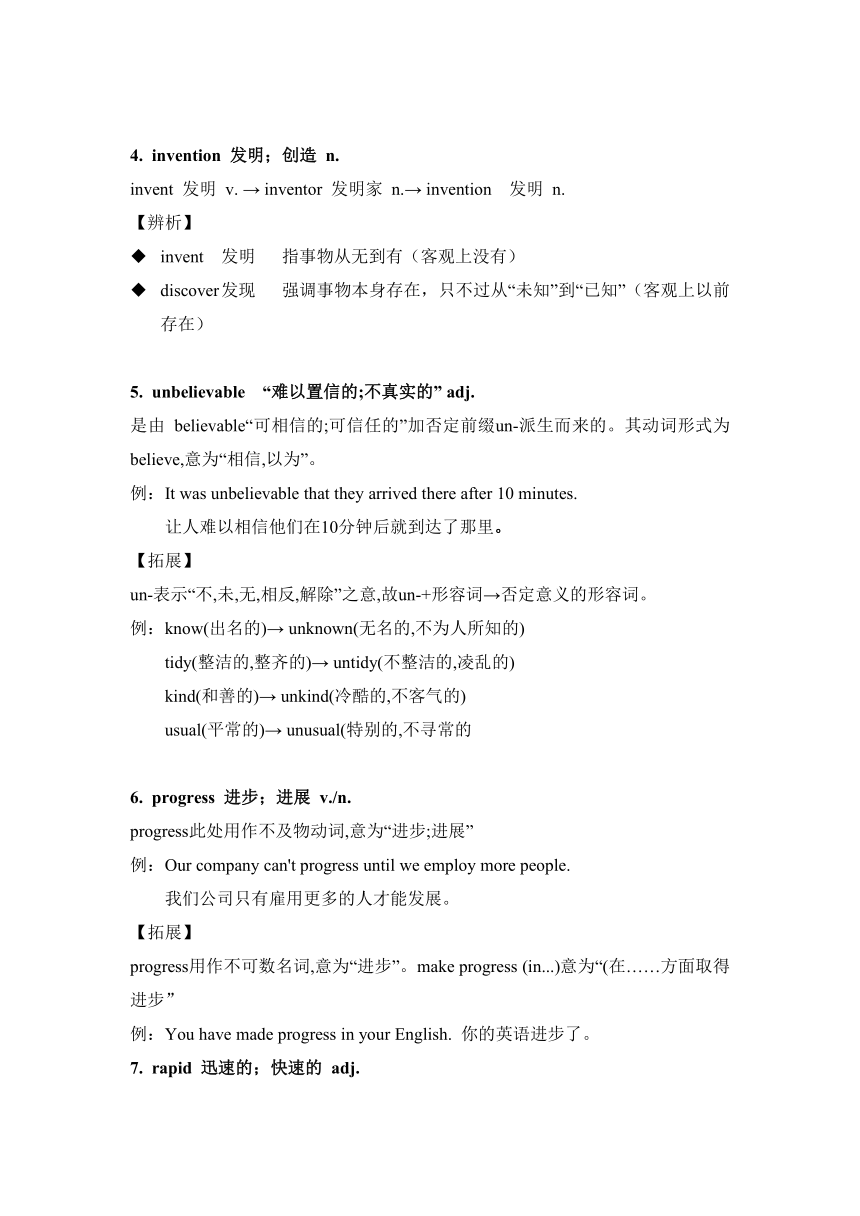
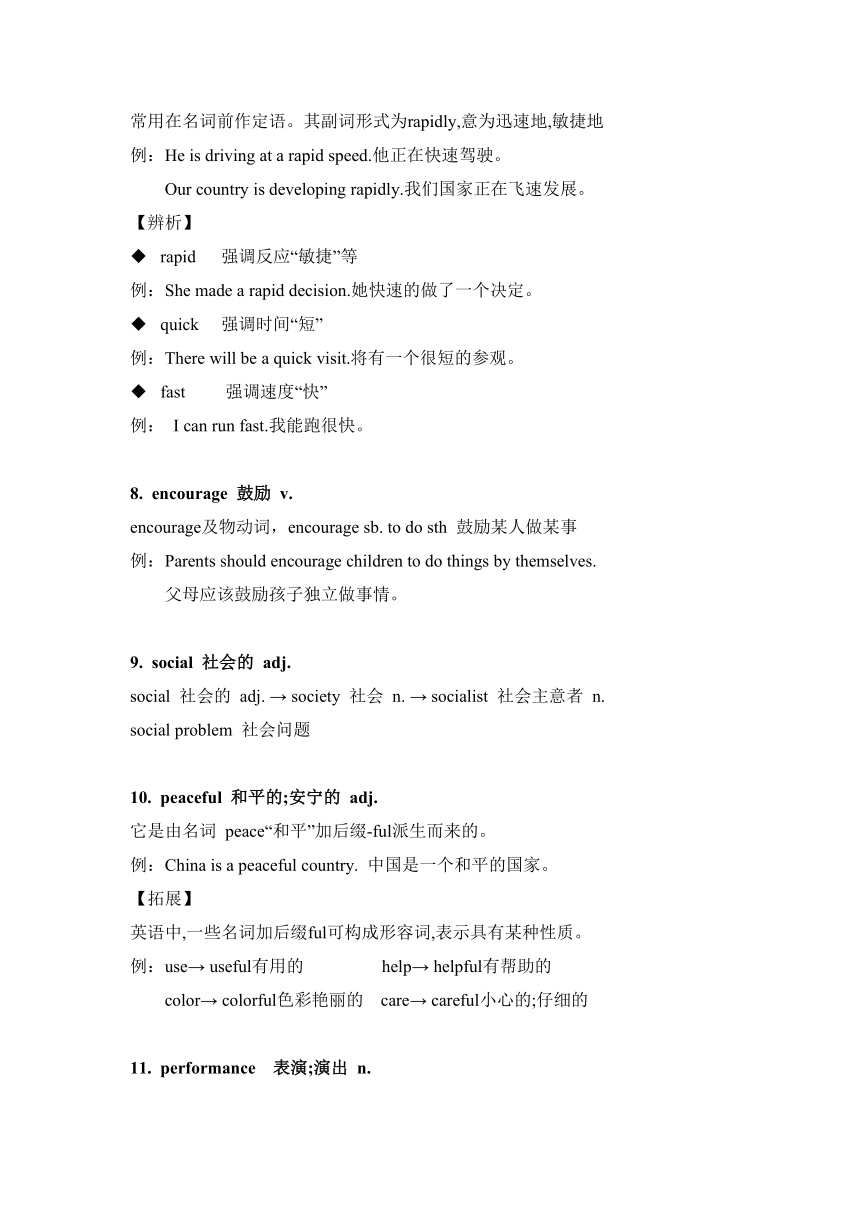
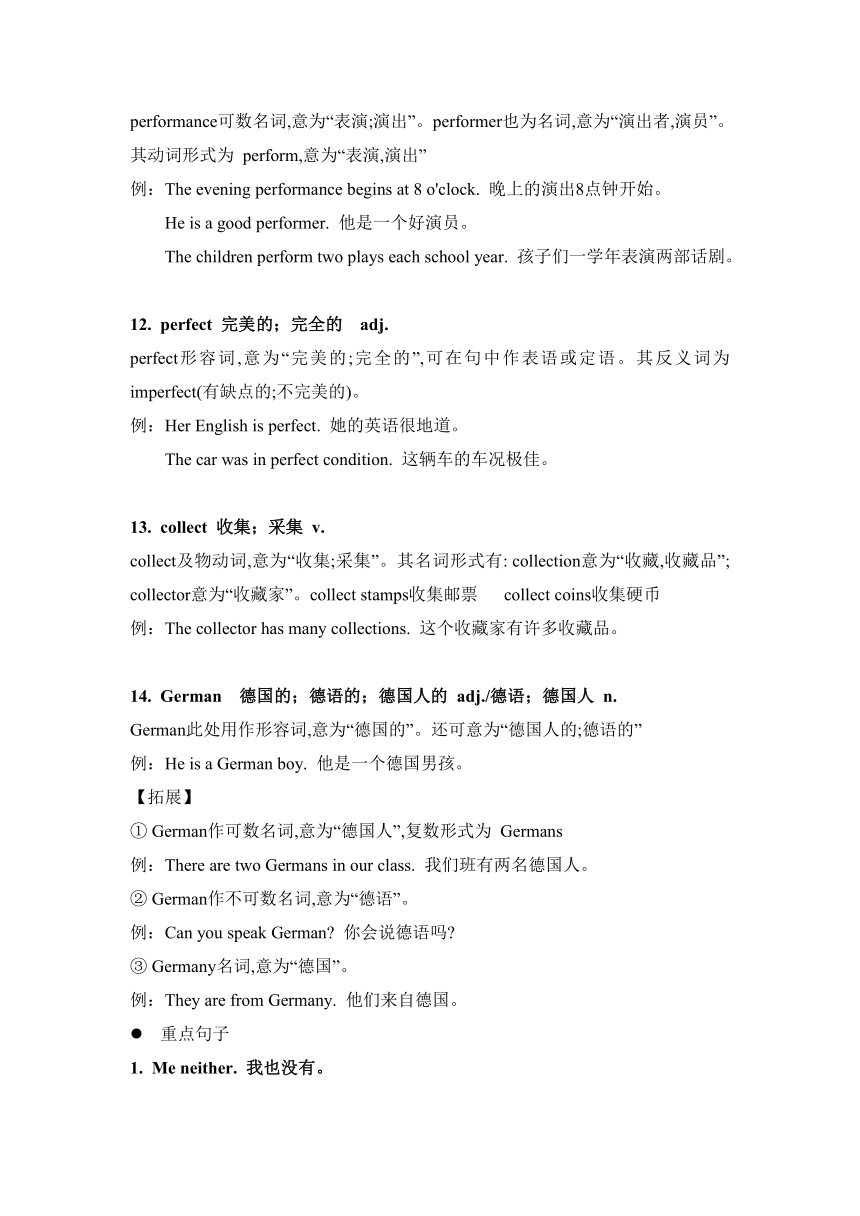
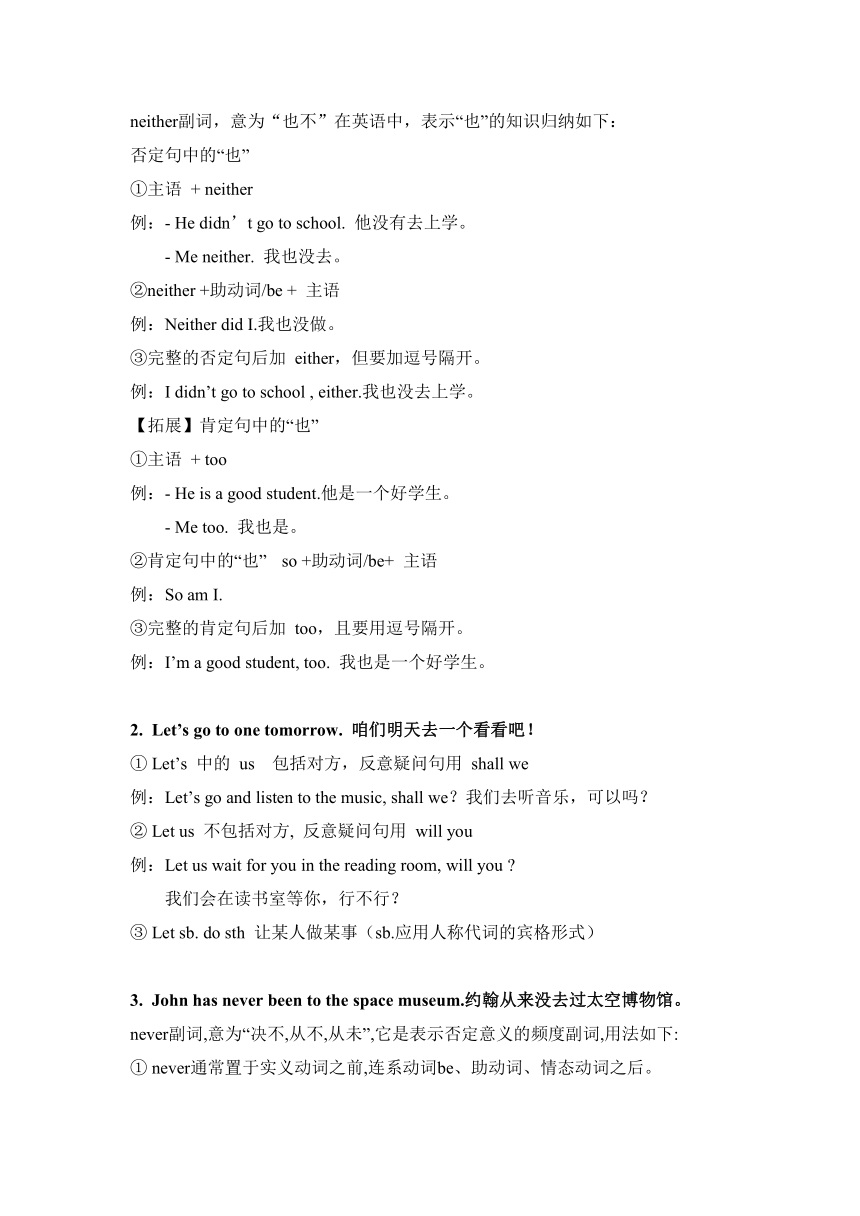
文档简介
Unit 7 Have you ever been to a museum
Section A
重点单词及短语
ever 曾经 adv.
ever “曾经”常与现在完成时连用,表示从过去到目前为止任何时候,且ever置于助动词之后,过去分词之前。
【注意】ever的反义词是never,意为“从未,未曾”当ever用于疑问句时,答语中不用ever,若是否定回答则用never。
例:-Have you read Harry Potter 你曾读过《哈利波特》吗?
-No,never.不,从来没有。
【拓展】hardly ever意为“几乎从不”,表示否定意义。
例:We hardly ever go out.我们几乎从不出门。
amusement park 游乐场
amusement名词,意为“娱乐;游戏”由amuse+后缀-ment构成。
例:There are lots of amusements in a big city.大城市有很多娱乐活动。
【拓展】
①amusement名词,还可意为“开心,好心的感觉,乐趣”
例:To everyone’s amusement,the actor fell off the stage on purpose.
令大家感到好笑的是,演员故意从舞台上掉了下来。
②amuse可作及物动词,意为“给……提供娱乐”,amusing形容词,意为“好笑的,有趣的”
例:He made funny faces to amuse the children. 他做鬼脸逗孩子们开心。
I find his jokes amusing. 我觉得他的笑话很好笑。
somewhere 在某处;到某处 adv.
通常用于肯定句中,在否定句或疑问句中要用 anywhere。形容词修饰 somewhere,anywhere,nowhere 等时,形容词通常置于其后。
例:I’m going to move somewhere interesting. 我打算搬到某个有趣的地方。
invention 发明;创造 n.
invent 发明 v. → inventor 发明家 n.→ invention 发明 n.
【辨析】
invent 发明 指事物从无到有(客观上没有)
discover 发现 强调事物本身存在,只不过从“未知”到“已知”(客观上以前存在)
unbelievable “难以置信的;不真实的” adj.
是由 believable“可相信的;可信任的”加否定前缀un-派生而来的。其动词形式为 believe,意为“相信,以为”。
例:It was unbelievable that they arrived there after 10 minutes.
让人难以相信他们在10分钟后就到达了那里。
【拓展】
un-表示“不,未,无,相反,解除”之意,故un-+形容词→否定意义的形容词。
例:know(出名的)→ unknown(无名的,不为人所知的)
tidy(整洁的,整齐的)→ untidy(不整洁的,凌乱的)
kind(和善的)→ unkind(冷酷的,不客气的)
usual(平常的)→ unusual(特别的,不寻常的
progress 进步;进展 v./n.
progress此处用作不及物动词,意为“进步;进展”
例:Our company can't progress until we employ more people.
我们公司只有雇用更多的人才能发展。
【拓展】
progress用作不可数名词,意为“进步”。make progress (in...)意为“(在……方面取得进步”
例:You have made progress in your English. 你的英语进步了。
rapid 迅速的;快速的 adj.
常用在名词前作定语。其副词形式为rapidly,意为迅速地,敏捷地
例:He is driving at a rapid speed.他正在快速驾驶。
Our country is developing rapidly.我们国家正在飞速发展。
【辨析】
rapid 强调反应“敏捷”等
例:She made a rapid decision.她快速的做了一个决定。
quick 强调时间“短”
例:There will be a quick visit.将有一个很短的参观。
fast 强调速度“快”
例: I can run fast.我能跑很快。
encourage 鼓励 v.
encourage及物动词,encourage sb. to do sth 鼓励某人做某事
例:Parents should encourage children to do things by themselves.
父母应该鼓励孩子独立做事情。
social 社会的 adj.
social 社会的 adj. → society 社会 n. → socialist 社会主意者 n.
social problem 社会问题
peaceful 和平的;安宁的 adj.
它是由名词 peace“和平”加后缀-ful派生而来的。
例:China is a peaceful country. 中国是一个和平的国家。
【拓展】
英语中,一些名词加后缀ful可构成形容词,表示具有某种性质。
例:use→ useful有用的 help→ helpful有帮助的
color→ colorful色彩艳丽的 care→ careful小心的;仔细的
performance 表演;演出 n.
performance可数名词,意为“表演;演出”。performer也为名词,意为“演出者,演员”。其动词形式为 perform,意为“表演,演出”
例:The evening performance begins at 8 o'clock. 晚上的演出8点钟开始。
He is a good performer. 他是一个好演员。
The children perform two plays each school year. 孩子们一学年表演两部话剧。
perfect 完美的;完全的 adj.
perfect形容词,意为“完美的;完全的”,可在句中作表语或定语。其反义词为 imperfect(有缺点的;不完美的)。
例:Her English is perfect. 她的英语很地道。
The car was in perfect condition. 这辆车的车况极佳。
collect 收集;采集 v.
collect及物动词,意为“收集;采集”。其名词形式有: collection意为“收藏,收藏品”; collector意为“收藏家”。collect stamps收集邮票 collect coins收集硬币
例:The collector has many collections. 这个收藏家有许多收藏品。
German 德国的;德语的;德国人的 adj./德语;德国人 n.
German此处用作形容词,意为“德国的”。还可意为“德国人的;德语的”
例:He is a German boy. 他是一个德国男孩。
【拓展】
① German作可数名词,意为“德国人”,复数形式为 Germans
例:There are two Germans in our class. 我们班有两名德国人。
② German作不可数名词,意为“德语”。
例:Can you speak German 你会说德语吗
③ Germany名词,意为“德国”。
例:They are from Germany. 他们来自德国。
重点句子
Me neither. 我也没有。
neither副词,意为“也不”在英语中,表示“也”的知识归纳如下:
否定句中的“也”
①主语 + neither
例:- He didn’t go to school. 他没有去上学。
- Me neither. 我也没去。
②neither +助动词/be + 主语
例:Neither did I.我也没做。
③完整的否定句后加 either,但要加逗号隔开。
例:I didn’t go to school , either.我也没去上学。
【拓展】肯定句中的“也”
①主语 + too
例:- He is a good student.他是一个好学生。
- Me too. 我也是。
②肯定句中的“也” so +助动词/be+ 主语
例:So am I.
③完整的肯定句后加 too,且要用逗号隔开。
例:I’m a good student, too. 我也是一个好学生。
Let’s go to one tomorrow. 咱们明天去一个看看吧!
① Let’s 中的 us 包括对方,反意疑问句用 shall we
例:Let’s go and listen to the music, shall we?我们去听音乐,可以吗?
② Let us 不包括对方, 反意疑问句用 will you
例:Let us wait for you in the reading room, will you
我们会在读书室等你,行不行?
③ Let sb. do sth 让某人做某事(sb.应用人称代词的宾格形式)
John has never been to the space museum.约翰从来没去过太空博物馆。
never副词,意为“决不,从不,从未”,它是表示否定意义的频度副词,用法如下:
① never通常置于实义动词之前,连系动词be、助动词、情态动词之后。
例:I never get up early on Sunday morning. 在星期日早晨我从不早起。
②有时置于句中特定词/短语之前,以强调该词短语的否定意味。
例:They spoke never a word to each other. 他们彼此从未交谈过一句话。
③ never可以置于祈使句之前。
例:Never eat too much. 绝不要吃得太多。
It' s really interesting,isn't it 它确实很有趣,是不是
这是一个反意疑问句。反意疑问句由“陈述句+附加问句”构成。附加部分常译为“是不是 /不是吗 /是吧 /对吗 ”等。反意疑问句有以下特点:
①反意疑问句遵循“前肯后否,前否后肯”的原则,即陈述部分为肯定时,疑问部分为否定;陈述部分为否定时,疑问部分为肯定。
例:Your elder sister didn't help him, did she 你姐姐没有帮助他,是吗
②当陈述句中有否定词few, little,. never,no,nobody, hardly, seldom等时,其后的疑问部分应用肯定形式。
例:He can hardly swim, can he 他几乎不会游泳,是吗?
We have little water,do we 我们几乎没有水了,对吗?
③陈述部分为 There be句型时,疑问部分的主语应用 there
例:There are some apples in the basket, aren't there 篮子里有一些苹果,是吗?
We put up a tent and cooked outside.我们搭起了一顶帐篷,并在外面做了饭。
put up意为“搭建,支起”,是由“动词+副词”构成的短语,名词作宾语时可放在两词中间或up的后面;人称代词作宾语时,只能放在两词中间。
例:He's putting a tent up.=He's putting up a tent. 他正在搭建帐篷。
【拓展】
put up还意为“张贴,举起”。
例:Can you help me to put up the notice on the wall
你能帮我把这个告示贴到墙上吗
Put up your hands, please!请举手!
I’ve never been camping.我从未野营过。
have been camping是现在完成进行时的结构。现在完成进行时表示从过去某一时间开始的动作,一直持续到现在,并且还在继续进行。现在完成进行时的谓语结构为 have/has been+现在分词。
例:What books have you been reading these day 这些天你一直在看什么书
Watching the tea preparation is just as enjoyable as drinking the tea itself.看沏茶的过程和饮茶本身一样令人享受。
(1) enjoyable形容词,意为“有乐趣的;使人快乐的令人愉快的”,是由动词 enjoy(享受……的乐趣加后缀-able构成的。
例:We had an enjoyable weekend. 我们过了一个令人愉快的周末。
itself反身代词,意为“它自己;自己”,此处作宾语 the tea的同位语,起强调宾语的作用。
例:The door seemed to open all by itself. 那扇门好像是自己打开的。
8. I’ve finally realized why my grandpa loves drinking tea and collecting tea sets.我终于明白了我祖父为什么喜欢喝茶,并且喜欢收集茶具。
这是一个含有宾语从句的主从复合句。why引导宾语从句。当宾语从句为疑问句时,要用陈述语序。
例:Could you tell me how he came here 你能告诉我他是怎样来这儿的吗
9. Most of us have seen(see) Mickey Mouse, Donald Duck and other famous Disney characters in cartoons before.我们中的大多数人以前在卡通片中(看)过米老鼠、唐老鸭和其他著名的迪斯尼人物。
(1) most of意为“……中的大多数”。它修饰的名词作主语时,谓语动词的单复数形式取决于 most of修饰的是可数名词还是不可数名词,若后接可数名词复数,则谓语动词用复数;若后接不可数名词或可数名词的单数形式,则谓语动词用单数。
例:Most of the students have been to the Great Wall. 大部分学生都去过长城。
Most of the food has gone bad. 大多数食物已变质。
(2)before副词,意为“以前”,常用于现在完成时。
例:He has never studied English before. 他以前从未学过英语。
【拓展】 before与ago
before和ago都可用作副词,表示“……之前”,但它们的用法有所不同。
before 表示从过去某时起的若干时间以前 多用于完成时或一般过去时
与时间段连用时,before后置,与时间点连用时,before前置
例:He said he had met her three days before. 他说他3天前遇到过她。
She got to the office before five o’clock. 她5点钟以前就到了办公室。
ago 表示从现在起的若干时间以前 常用于一般过去时
只能与一段时间连用,且ago后置
例:He met her three days ago. 他3天前遇见过她。
And have you ever heard(hear)of a Disney Cruise 你曾经(听说)过迪斯尼巡游吗
hear of意为“听说,听到”,后跟名词或代词,指间接听到某人、某事。
例:I’ve never heard of that village. 我从未听说过那个村庄。
【辨析】 hear of,hear与 hear from
hear of 听说,听到 同义词组为 hear about,后跟名词或代词,指听到别人说
起某人、某事
例:Tom disappeared and we never heard of him.
汤姆不知去向,我们再也没有听到他的消息。
hear 听到 强调结果,后可跟从句
例:We listened but could hear nothing. 我们听了,但什么也没听到。
I heard that he was ill. 我听说他病了。
hear from 收到……的来信 和 get a letter from同义。后跟表示人的名词或代词,而不跟 letter等词
例:I heard from my elder sister last week.我上周收到了姐姐的来信。
...been to another province in China …去过中国的其他省份吗
another此处用作形容词,意为“另一,又一;别的,另外的”。后常接单数名词或代词。还可用作代词,泛指三者或三者以上中的另一个。
例:We need another chair.我们需要另一把椅子。
【辨析】 other, the other, others, the others与 another
other 意为“其他的”,只作定语,常与名词复数连用相当于 others
例:We study Chinese, English, math and other subjects.
我们学习语文、英语、数学和其他课程。
the other 表示两者中的另一个,是特指,常用于“one...the other...”结构中,意为“一个……另一个……”;其后可接数词或名词复数,特指“其他的
例:I have two brothers. One is a doctor, and the other is a worker.
我有两个哥哥。一个是医生,另一个是工人。
others 用作代词,泛指其他的人或物,some...others...意为“有的……,有的……”
例:We should think of others. 我们应该为他人着想。
the others 特指在一个整体中的其他的人或物,相当于the other+名词复数”
例:。There are fifty-five students in our class. Thirty of us are girls, and the others are boys. 我们班有55名学生。30名是女生,其余的是男生
another 泛指三者或三者以上中的任何一个,后常接名词单数;还可用作代词
例:Show me another please. 这件衬衣对我来说太小了,请给我拿另一件。
【拓展】another还可用于“ another+基数词+可数名词复数”结构中,意为“再有几个……,还有几个……”,相当于“基数词+more+可数名词复数”。
例:I need another two books.=I need two more books. 我还需要两本书。
Section B
重点单词及短语
thousands of 数以千计的;许许多多的
thousand意为“千,一千”。当前面有具体数字时其后不加-s,不和of连用,此时表示确切的数目;若表示一个不确切的数目,且前面没有具体数字时,其后要加-s,且与of连用。
例:There are six thousand students in our school. 我们学校有6千名学生。
Thousands of birds are flying to the south. 成千上万只鸟儿正飞往南方。
safe 安全的;无危险的 adj.
其名词形式为 safety,意为“安全”;副词形式为 safely,意为“安全地”;反义词为 dangerous,意为“危险的”。
例:It's not safe to swim in the river. 在这条河里游泳是不安全的。
fear 害怕;惧怕 v./n.
fear此处用作及物动词,意为“害怕;惧怕”,其后可接名词、动名词、动词不定式或从句作宾语。后接动名词表示习惯性动作;后接动词不定式表示某次具体的动作例:Mice fear cats. 老鼠怕猫。
He fears to tell me the reasons for being late. 他害怕告诉我迟到的原因。
The shy girl fears looking up at others. 这个害羞的女孩害怕抬头看别人。
【拓展】fear还可用作名词,意为“害怕,恐惧”。
例:His eyes show no fear.他的眼神中无丝毫畏惧。
whether 不管……(还是);或者……(或者);是否 conj.
whether连词,意为“不管……(还是);或者……(或者)”,引人选择的内容,引导状语从句。whether常与or或 or not连用。
例:Whether she wins or loses, this is her last tournament.
不管她是蠃还是输,歈是她的最后一次锦标赛。
Whether you like it or not, you'll have to do it.
不管你是喜欢还是不喜欢,你将必须做这件事。
【拓展】 whether作连词时,还可意为“是否”,相当于i,引导宾语从句。
例:Ask him whether he can come.问问他是否能来。
Indian 印度的 adj./印度人 n.
其名词形式是 India印度
例:She is an Indian girl.她是个印度女孩。
Three Indians visited our school yesterday。昨天三个印度人参观了我们的学校。
【拓展】英语中,一些表示国家或地区的名词,可加后缀-(a)n,构成形容词,意为“…(人)的”。
America美国;美洲→ American美国(人)的;美洲的
Australia澳大利亚→ Australian澳大利亚(人)的
Europe欧洲→ European欧洲(人)的
Africa非洲→ African非洲(人)的
Japanese 日本的;日本人的;日语的 adj./ 日本人;日语 n.
Japanese此处用作形容词,意为“日本的”,其名词形式是 Japan(日本)。 Japanese作形容词时,还可意为“日本人的;日语的”。
例:Is that a Japanese car 那是一辆日本产的小汽车吗?
【拓展】① Japanese用作可数名词,意为“日本人”,其单复数形式相同。
a Japanese 一个日本人 ten Japanese 十个日本人
②Japanese用作不可数名词,意为“日语”
例:He can speak a little Japanese. 他会讲一点儿日语。
重点句子
On the one hand, more than three quarters of the population are Chinese, so you can simply speak Putonghua a lot of the time. On the other hand, Singapore is an English-speaking country, so it,'s also a good place to practice your English!一方面,超过四分之三的人口是华人,因此很多时候你可以只讲普通话。另一方面,新加坡是一个说英语的国家,因此它也是一个练习你的英语的好地方!
(1) on the one hand. on the other hand.意为“一方面…另一方面…”。其中 on the one hand中的the也可以省略。
例:On ( the ) one hand, this job doesn't pay very much; on the other hand, I can't get another one. 一方面这份工作报酬不是很高,另一方面我又找不到其他工作。
(2) three quarters意为“四分之三”。英语中的分数表达法为:分子用基数词,分母用序数词,当分子大于时,分母要用复数形式。“四分之三”还可写作three fourths
a quarter四分之一 a half二分之一 two thirds三分之二
【拓展】分数作主语时,谓语动词的单复数要与其后面的名词的数保持一致。若名词为可数名词复数形式,谓语动词用复数形式;若名词为可数名词单数形式或不可数名词,谓语动词用第三人称单数形式。
例:One fifth of the water is dirty.五分之一的水是脏的。
Three fifths of the students in our class are girls.
我们班里五分之三的学生是女生。
simply副词,意为“仅仅;只;不过”,相当于just
例:I bought the house simply because it was large.
我购买了这套房子,只是因为它面积大。
English-speaking意为“说英语的”,是一个复合形容词,如 Chinese- speaking“说汉语的”
例:Australia is an English-speaking country。 澳大利亚是一个讲英语的国家。
However, if you go to see lions, tigers or foxes during the daytime, they’ll probably be asleep.然而,如果你在白天去看狮子、老虎或狐狸,大概它们都会在睡觉!
during介词,意为“在……期间”,后可接时间段。
during the day 在白天 during January 在1月期间 during2012 在2012年期间
during our stay in Beijing在我们待在北京期间
【辨析】 during, for与 in
during 在说到某事是在某一段时间之内发生的
例:We visited many places of interest during the summer holiday.
暑假期间我们参观了很多名胜古迹。
for 说到某事持续多久则用for;
例:I've been here for two weeks.我在儿待了两周
In 说到某事具体发生的时间用in
例:They usually leave school in July.他们通常七月份毕业。
One great thing about Singapore is that the temperature is almost the same all year round.新加坡一个很大的特征是温度几乎全年是一样的。
(1)本句是一个复合句, that the temperature is almost the same all year round在is后作表语,即表语从句,that本身无意义,起引导作用。
例:Can you see the house That is where he lived five years ago.
你能看到那座房子吗 那是他5年前居住的地方。
same形容词,意为“相同的,同样的”,通常和定冠词the连用。same的反义词是 different.
例:They got to school at the same time. 他们同时到达了学校。
(3) all year round意为“一年到头,终年”,相当于all the year.
例:The farmers are busy all year round. 农民一年到头都在忙。
So you can choose to go whenever you like.因此,你可以选择你喜欢的任何时间去……
choose动词,意为“选择”,其名词形式为choice。choose to do sth.意为“选择做某事”。
例:I chose to go with you我选择和你一起去。
whenever连词,意为“无论何时;在任何…时候”,与 no matter when同义。
例:You can ask for help whenever you need it.你无论何时需要帮助可以提出来
【拓展】类似的词还有:
Whatever=no matter what无论什么 however=no matter how不管怎样
wherever= no matter where无论哪里
Section A
重点单词及短语
ever 曾经 adv.
ever “曾经”常与现在完成时连用,表示从过去到目前为止任何时候,且ever置于助动词之后,过去分词之前。
【注意】ever的反义词是never,意为“从未,未曾”当ever用于疑问句时,答语中不用ever,若是否定回答则用never。
例:-Have you read Harry Potter 你曾读过《哈利波特》吗?
-No,never.不,从来没有。
【拓展】hardly ever意为“几乎从不”,表示否定意义。
例:We hardly ever go out.我们几乎从不出门。
amusement park 游乐场
amusement名词,意为“娱乐;游戏”由amuse+后缀-ment构成。
例:There are lots of amusements in a big city.大城市有很多娱乐活动。
【拓展】
①amusement名词,还可意为“开心,好心的感觉,乐趣”
例:To everyone’s amusement,the actor fell off the stage on purpose.
令大家感到好笑的是,演员故意从舞台上掉了下来。
②amuse可作及物动词,意为“给……提供娱乐”,amusing形容词,意为“好笑的,有趣的”
例:He made funny faces to amuse the children. 他做鬼脸逗孩子们开心。
I find his jokes amusing. 我觉得他的笑话很好笑。
somewhere 在某处;到某处 adv.
通常用于肯定句中,在否定句或疑问句中要用 anywhere。形容词修饰 somewhere,anywhere,nowhere 等时,形容词通常置于其后。
例:I’m going to move somewhere interesting. 我打算搬到某个有趣的地方。
invention 发明;创造 n.
invent 发明 v. → inventor 发明家 n.→ invention 发明 n.
【辨析】
invent 发明 指事物从无到有(客观上没有)
discover 发现 强调事物本身存在,只不过从“未知”到“已知”(客观上以前存在)
unbelievable “难以置信的;不真实的” adj.
是由 believable“可相信的;可信任的”加否定前缀un-派生而来的。其动词形式为 believe,意为“相信,以为”。
例:It was unbelievable that they arrived there after 10 minutes.
让人难以相信他们在10分钟后就到达了那里。
【拓展】
un-表示“不,未,无,相反,解除”之意,故un-+形容词→否定意义的形容词。
例:know(出名的)→ unknown(无名的,不为人所知的)
tidy(整洁的,整齐的)→ untidy(不整洁的,凌乱的)
kind(和善的)→ unkind(冷酷的,不客气的)
usual(平常的)→ unusual(特别的,不寻常的
progress 进步;进展 v./n.
progress此处用作不及物动词,意为“进步;进展”
例:Our company can't progress until we employ more people.
我们公司只有雇用更多的人才能发展。
【拓展】
progress用作不可数名词,意为“进步”。make progress (in...)意为“(在……方面取得进步”
例:You have made progress in your English. 你的英语进步了。
rapid 迅速的;快速的 adj.
常用在名词前作定语。其副词形式为rapidly,意为迅速地,敏捷地
例:He is driving at a rapid speed.他正在快速驾驶。
Our country is developing rapidly.我们国家正在飞速发展。
【辨析】
rapid 强调反应“敏捷”等
例:She made a rapid decision.她快速的做了一个决定。
quick 强调时间“短”
例:There will be a quick visit.将有一个很短的参观。
fast 强调速度“快”
例: I can run fast.我能跑很快。
encourage 鼓励 v.
encourage及物动词,encourage sb. to do sth 鼓励某人做某事
例:Parents should encourage children to do things by themselves.
父母应该鼓励孩子独立做事情。
social 社会的 adj.
social 社会的 adj. → society 社会 n. → socialist 社会主意者 n.
social problem 社会问题
peaceful 和平的;安宁的 adj.
它是由名词 peace“和平”加后缀-ful派生而来的。
例:China is a peaceful country. 中国是一个和平的国家。
【拓展】
英语中,一些名词加后缀ful可构成形容词,表示具有某种性质。
例:use→ useful有用的 help→ helpful有帮助的
color→ colorful色彩艳丽的 care→ careful小心的;仔细的
performance 表演;演出 n.
performance可数名词,意为“表演;演出”。performer也为名词,意为“演出者,演员”。其动词形式为 perform,意为“表演,演出”
例:The evening performance begins at 8 o'clock. 晚上的演出8点钟开始。
He is a good performer. 他是一个好演员。
The children perform two plays each school year. 孩子们一学年表演两部话剧。
perfect 完美的;完全的 adj.
perfect形容词,意为“完美的;完全的”,可在句中作表语或定语。其反义词为 imperfect(有缺点的;不完美的)。
例:Her English is perfect. 她的英语很地道。
The car was in perfect condition. 这辆车的车况极佳。
collect 收集;采集 v.
collect及物动词,意为“收集;采集”。其名词形式有: collection意为“收藏,收藏品”; collector意为“收藏家”。collect stamps收集邮票 collect coins收集硬币
例:The collector has many collections. 这个收藏家有许多收藏品。
German 德国的;德语的;德国人的 adj./德语;德国人 n.
German此处用作形容词,意为“德国的”。还可意为“德国人的;德语的”
例:He is a German boy. 他是一个德国男孩。
【拓展】
① German作可数名词,意为“德国人”,复数形式为 Germans
例:There are two Germans in our class. 我们班有两名德国人。
② German作不可数名词,意为“德语”。
例:Can you speak German 你会说德语吗
③ Germany名词,意为“德国”。
例:They are from Germany. 他们来自德国。
重点句子
Me neither. 我也没有。
neither副词,意为“也不”在英语中,表示“也”的知识归纳如下:
否定句中的“也”
①主语 + neither
例:- He didn’t go to school. 他没有去上学。
- Me neither. 我也没去。
②neither +助动词/be + 主语
例:Neither did I.我也没做。
③完整的否定句后加 either,但要加逗号隔开。
例:I didn’t go to school , either.我也没去上学。
【拓展】肯定句中的“也”
①主语 + too
例:- He is a good student.他是一个好学生。
- Me too. 我也是。
②肯定句中的“也” so +助动词/be+ 主语
例:So am I.
③完整的肯定句后加 too,且要用逗号隔开。
例:I’m a good student, too. 我也是一个好学生。
Let’s go to one tomorrow. 咱们明天去一个看看吧!
① Let’s 中的 us 包括对方,反意疑问句用 shall we
例:Let’s go and listen to the music, shall we?我们去听音乐,可以吗?
② Let us 不包括对方, 反意疑问句用 will you
例:Let us wait for you in the reading room, will you
我们会在读书室等你,行不行?
③ Let sb. do sth 让某人做某事(sb.应用人称代词的宾格形式)
John has never been to the space museum.约翰从来没去过太空博物馆。
never副词,意为“决不,从不,从未”,它是表示否定意义的频度副词,用法如下:
① never通常置于实义动词之前,连系动词be、助动词、情态动词之后。
例:I never get up early on Sunday morning. 在星期日早晨我从不早起。
②有时置于句中特定词/短语之前,以强调该词短语的否定意味。
例:They spoke never a word to each other. 他们彼此从未交谈过一句话。
③ never可以置于祈使句之前。
例:Never eat too much. 绝不要吃得太多。
It' s really interesting,isn't it 它确实很有趣,是不是
这是一个反意疑问句。反意疑问句由“陈述句+附加问句”构成。附加部分常译为“是不是 /不是吗 /是吧 /对吗 ”等。反意疑问句有以下特点:
①反意疑问句遵循“前肯后否,前否后肯”的原则,即陈述部分为肯定时,疑问部分为否定;陈述部分为否定时,疑问部分为肯定。
例:Your elder sister didn't help him, did she 你姐姐没有帮助他,是吗
②当陈述句中有否定词few, little,. never,no,nobody, hardly, seldom等时,其后的疑问部分应用肯定形式。
例:He can hardly swim, can he 他几乎不会游泳,是吗?
We have little water,do we 我们几乎没有水了,对吗?
③陈述部分为 There be句型时,疑问部分的主语应用 there
例:There are some apples in the basket, aren't there 篮子里有一些苹果,是吗?
We put up a tent and cooked outside.我们搭起了一顶帐篷,并在外面做了饭。
put up意为“搭建,支起”,是由“动词+副词”构成的短语,名词作宾语时可放在两词中间或up的后面;人称代词作宾语时,只能放在两词中间。
例:He's putting a tent up.=He's putting up a tent. 他正在搭建帐篷。
【拓展】
put up还意为“张贴,举起”。
例:Can you help me to put up the notice on the wall
你能帮我把这个告示贴到墙上吗
Put up your hands, please!请举手!
I’ve never been camping.我从未野营过。
have been camping是现在完成进行时的结构。现在完成进行时表示从过去某一时间开始的动作,一直持续到现在,并且还在继续进行。现在完成进行时的谓语结构为 have/has been+现在分词。
例:What books have you been reading these day 这些天你一直在看什么书
Watching the tea preparation is just as enjoyable as drinking the tea itself.看沏茶的过程和饮茶本身一样令人享受。
(1) enjoyable形容词,意为“有乐趣的;使人快乐的令人愉快的”,是由动词 enjoy(享受……的乐趣加后缀-able构成的。
例:We had an enjoyable weekend. 我们过了一个令人愉快的周末。
itself反身代词,意为“它自己;自己”,此处作宾语 the tea的同位语,起强调宾语的作用。
例:The door seemed to open all by itself. 那扇门好像是自己打开的。
8. I’ve finally realized why my grandpa loves drinking tea and collecting tea sets.我终于明白了我祖父为什么喜欢喝茶,并且喜欢收集茶具。
这是一个含有宾语从句的主从复合句。why引导宾语从句。当宾语从句为疑问句时,要用陈述语序。
例:Could you tell me how he came here 你能告诉我他是怎样来这儿的吗
9. Most of us have seen(see) Mickey Mouse, Donald Duck and other famous Disney characters in cartoons before.我们中的大多数人以前在卡通片中(看)过米老鼠、唐老鸭和其他著名的迪斯尼人物。
(1) most of意为“……中的大多数”。它修饰的名词作主语时,谓语动词的单复数形式取决于 most of修饰的是可数名词还是不可数名词,若后接可数名词复数,则谓语动词用复数;若后接不可数名词或可数名词的单数形式,则谓语动词用单数。
例:Most of the students have been to the Great Wall. 大部分学生都去过长城。
Most of the food has gone bad. 大多数食物已变质。
(2)before副词,意为“以前”,常用于现在完成时。
例:He has never studied English before. 他以前从未学过英语。
【拓展】 before与ago
before和ago都可用作副词,表示“……之前”,但它们的用法有所不同。
before 表示从过去某时起的若干时间以前 多用于完成时或一般过去时
与时间段连用时,before后置,与时间点连用时,before前置
例:He said he had met her three days before. 他说他3天前遇到过她。
She got to the office before five o’clock. 她5点钟以前就到了办公室。
ago 表示从现在起的若干时间以前 常用于一般过去时
只能与一段时间连用,且ago后置
例:He met her three days ago. 他3天前遇见过她。
And have you ever heard(hear)of a Disney Cruise 你曾经(听说)过迪斯尼巡游吗
hear of意为“听说,听到”,后跟名词或代词,指间接听到某人、某事。
例:I’ve never heard of that village. 我从未听说过那个村庄。
【辨析】 hear of,hear与 hear from
hear of 听说,听到 同义词组为 hear about,后跟名词或代词,指听到别人说
起某人、某事
例:Tom disappeared and we never heard of him.
汤姆不知去向,我们再也没有听到他的消息。
hear 听到 强调结果,后可跟从句
例:We listened but could hear nothing. 我们听了,但什么也没听到。
I heard that he was ill. 我听说他病了。
hear from 收到……的来信 和 get a letter from同义。后跟表示人的名词或代词,而不跟 letter等词
例:I heard from my elder sister last week.我上周收到了姐姐的来信。
...been to another province in China …去过中国的其他省份吗
another此处用作形容词,意为“另一,又一;别的,另外的”。后常接单数名词或代词。还可用作代词,泛指三者或三者以上中的另一个。
例:We need another chair.我们需要另一把椅子。
【辨析】 other, the other, others, the others与 another
other 意为“其他的”,只作定语,常与名词复数连用相当于 others
例:We study Chinese, English, math and other subjects.
我们学习语文、英语、数学和其他课程。
the other 表示两者中的另一个,是特指,常用于“one...the other...”结构中,意为“一个……另一个……”;其后可接数词或名词复数,特指“其他的
例:I have two brothers. One is a doctor, and the other is a worker.
我有两个哥哥。一个是医生,另一个是工人。
others 用作代词,泛指其他的人或物,some...others...意为“有的……,有的……”
例:We should think of others. 我们应该为他人着想。
the others 特指在一个整体中的其他的人或物,相当于the other+名词复数”
例:。There are fifty-five students in our class. Thirty of us are girls, and the others are boys. 我们班有55名学生。30名是女生,其余的是男生
another 泛指三者或三者以上中的任何一个,后常接名词单数;还可用作代词
例:Show me another please. 这件衬衣对我来说太小了,请给我拿另一件。
【拓展】another还可用于“ another+基数词+可数名词复数”结构中,意为“再有几个……,还有几个……”,相当于“基数词+more+可数名词复数”。
例:I need another two books.=I need two more books. 我还需要两本书。
Section B
重点单词及短语
thousands of 数以千计的;许许多多的
thousand意为“千,一千”。当前面有具体数字时其后不加-s,不和of连用,此时表示确切的数目;若表示一个不确切的数目,且前面没有具体数字时,其后要加-s,且与of连用。
例:There are six thousand students in our school. 我们学校有6千名学生。
Thousands of birds are flying to the south. 成千上万只鸟儿正飞往南方。
safe 安全的;无危险的 adj.
其名词形式为 safety,意为“安全”;副词形式为 safely,意为“安全地”;反义词为 dangerous,意为“危险的”。
例:It's not safe to swim in the river. 在这条河里游泳是不安全的。
fear 害怕;惧怕 v./n.
fear此处用作及物动词,意为“害怕;惧怕”,其后可接名词、动名词、动词不定式或从句作宾语。后接动名词表示习惯性动作;后接动词不定式表示某次具体的动作例:Mice fear cats. 老鼠怕猫。
He fears to tell me the reasons for being late. 他害怕告诉我迟到的原因。
The shy girl fears looking up at others. 这个害羞的女孩害怕抬头看别人。
【拓展】fear还可用作名词,意为“害怕,恐惧”。
例:His eyes show no fear.他的眼神中无丝毫畏惧。
whether 不管……(还是);或者……(或者);是否 conj.
whether连词,意为“不管……(还是);或者……(或者)”,引人选择的内容,引导状语从句。whether常与or或 or not连用。
例:Whether she wins or loses, this is her last tournament.
不管她是蠃还是输,歈是她的最后一次锦标赛。
Whether you like it or not, you'll have to do it.
不管你是喜欢还是不喜欢,你将必须做这件事。
【拓展】 whether作连词时,还可意为“是否”,相当于i,引导宾语从句。
例:Ask him whether he can come.问问他是否能来。
Indian 印度的 adj./印度人 n.
其名词形式是 India印度
例:She is an Indian girl.她是个印度女孩。
Three Indians visited our school yesterday。昨天三个印度人参观了我们的学校。
【拓展】英语中,一些表示国家或地区的名词,可加后缀-(a)n,构成形容词,意为“…(人)的”。
America美国;美洲→ American美国(人)的;美洲的
Australia澳大利亚→ Australian澳大利亚(人)的
Europe欧洲→ European欧洲(人)的
Africa非洲→ African非洲(人)的
Japanese 日本的;日本人的;日语的 adj./ 日本人;日语 n.
Japanese此处用作形容词,意为“日本的”,其名词形式是 Japan(日本)。 Japanese作形容词时,还可意为“日本人的;日语的”。
例:Is that a Japanese car 那是一辆日本产的小汽车吗?
【拓展】① Japanese用作可数名词,意为“日本人”,其单复数形式相同。
a Japanese 一个日本人 ten Japanese 十个日本人
②Japanese用作不可数名词,意为“日语”
例:He can speak a little Japanese. 他会讲一点儿日语。
重点句子
On the one hand, more than three quarters of the population are Chinese, so you can simply speak Putonghua a lot of the time. On the other hand, Singapore is an English-speaking country, so it,'s also a good place to practice your English!一方面,超过四分之三的人口是华人,因此很多时候你可以只讲普通话。另一方面,新加坡是一个说英语的国家,因此它也是一个练习你的英语的好地方!
(1) on the one hand. on the other hand.意为“一方面…另一方面…”。其中 on the one hand中的the也可以省略。
例:On ( the ) one hand, this job doesn't pay very much; on the other hand, I can't get another one. 一方面这份工作报酬不是很高,另一方面我又找不到其他工作。
(2) three quarters意为“四分之三”。英语中的分数表达法为:分子用基数词,分母用序数词,当分子大于时,分母要用复数形式。“四分之三”还可写作three fourths
a quarter四分之一 a half二分之一 two thirds三分之二
【拓展】分数作主语时,谓语动词的单复数要与其后面的名词的数保持一致。若名词为可数名词复数形式,谓语动词用复数形式;若名词为可数名词单数形式或不可数名词,谓语动词用第三人称单数形式。
例:One fifth of the water is dirty.五分之一的水是脏的。
Three fifths of the students in our class are girls.
我们班里五分之三的学生是女生。
simply副词,意为“仅仅;只;不过”,相当于just
例:I bought the house simply because it was large.
我购买了这套房子,只是因为它面积大。
English-speaking意为“说英语的”,是一个复合形容词,如 Chinese- speaking“说汉语的”
例:Australia is an English-speaking country。 澳大利亚是一个讲英语的国家。
However, if you go to see lions, tigers or foxes during the daytime, they’ll probably be asleep.然而,如果你在白天去看狮子、老虎或狐狸,大概它们都会在睡觉!
during介词,意为“在……期间”,后可接时间段。
during the day 在白天 during January 在1月期间 during2012 在2012年期间
during our stay in Beijing在我们待在北京期间
【辨析】 during, for与 in
during 在说到某事是在某一段时间之内发生的
例:We visited many places of interest during the summer holiday.
暑假期间我们参观了很多名胜古迹。
for 说到某事持续多久则用for;
例:I've been here for two weeks.我在儿待了两周
In 说到某事具体发生的时间用in
例:They usually leave school in July.他们通常七月份毕业。
One great thing about Singapore is that the temperature is almost the same all year round.新加坡一个很大的特征是温度几乎全年是一样的。
(1)本句是一个复合句, that the temperature is almost the same all year round在is后作表语,即表语从句,that本身无意义,起引导作用。
例:Can you see the house That is where he lived five years ago.
你能看到那座房子吗 那是他5年前居住的地方。
same形容词,意为“相同的,同样的”,通常和定冠词the连用。same的反义词是 different.
例:They got to school at the same time. 他们同时到达了学校。
(3) all year round意为“一年到头,终年”,相当于all the year.
例:The farmers are busy all year round. 农民一年到头都在忙。
So you can choose to go whenever you like.因此,你可以选择你喜欢的任何时间去……
choose动词,意为“选择”,其名词形式为choice。choose to do sth.意为“选择做某事”。
例:I chose to go with you我选择和你一起去。
whenever连词,意为“无论何时;在任何…时候”,与 no matter when同义。
例:You can ask for help whenever you need it.你无论何时需要帮助可以提出来
【拓展】类似的词还有:
Whatever=no matter what无论什么 however=no matter how不管怎样
wherever= no matter where无论哪里
同课章节目录
- Unit 1 Could you please clean your room?
- Section A
- Section B
- Unit 2 Why don't you talk to your parents?
- Section A
- Section B
- Unit 3 What were you doing when the rainstorm came
- Section A
- Section B
- Unit 4 An old man tried to move the mountains.
- Section A
- Section B
- Unit 5 What's the highest mountain in the world?
- Section A
- Section B
- Unit 6 Have you read Treasure Island yet?
- Section A
- Section B
- Unit 7 Have you ever been to a museum?
- Section A
- Section B
- Unit 8 I've had this bike for three years.
- Section A
- Section B
